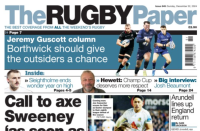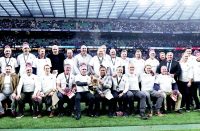 It’s that time of year when I am filled with a mixture of emotions ranging from excitement to regret. The start of the world’s premier rugby competition brings a tingle of excitement for what lies ahead over the next month or so.
It’s that time of year when I am filled with a mixture of emotions ranging from excitement to regret. The start of the world’s premier rugby competition brings a tingle of excitement for what lies ahead over the next month or so.
As an ex-player you never forget the feeling of preparing for, or taking part in each of the games and the different challenges that you face.
World Cups may now be the top of the tree as the sport’s premier competition, but as a player you have to put that as a clear second to playing in the Five Nations, as it was when I played, or the Six Nations as it is now.
Why would I say that? Simply because you can’t think of World Cups until you have cemented your place in your country’s national side and as some players will sadly find out next year, a dip in form or injury can see you out of the World Cup squad and you never get the chance again.
Added to that, the standard of some of the teams in the World Cup will be nowhere near good enough to compete with the foundation Unions, thereby making a lot of games just practice runs – but the Six Nations are different.
The traditional historic rivalries and the fact that, generally speaking, all the teams are now of a similar standard with only minor variations, make the intensity and pace of the games unbelievable.
It’s unlikely that any of the new caps, including those playing at the top of the club game, would have experienced anything like it.
Representing your country in sport, although it may mean different things to different people, remains a unique experience that cannot be equalled in any other area of life.
To carry with you the hopes and aspirations of a nation in a one-off match that can never be repeated is a huge responsibility. Also, it may be the only time you will ever be selected, so it brings a special kind of mind set.
Over my career I played many times against Welsh club teams starting back in schools rugby but the Scots, Irish and French were a mystery.
As a player, it was always the French who raised the most adrenalin-fuelled anxiety for me, partly because French rugby was a much less known commodity back when I played as there were few, if any cross-Channel competitions taking place. But the rumours about the physicality of their forwards and the skill of their backs were the stuff of legend.
Despite being a member of the England squad for three years before selection finally came my way, I wasn’t really prepared for what I encountered when I ran out onto the Parc de Princes pitch on January 16, 1988.
The Judge (Paul Rendall) had told me what to expect but to keep calm and controlled. I asked him about the game and he said, “If they get the ball, tackle the nearest player to you.” I said, “What if he doesn’t have the ball?” His reply was, “Don’t worry he soon will.”
This is a match etched in my memory and my only loss in seven matches against the French. I was punched in the first lineout and hit every time I struck the ball against the head (four times) and despite going into the final minutes of the game ahead, we lost 10-9 to a last-minute break-out try by French No.8 Laurent Rodriguez.
Had we played the game now, thanks to the use of fourth officials, we would have won that one as well because Kevin Sims scored a try that was disallowed when Irish referee Owen Doyle was accidentally knocked off his feet by Micky Skinner (also winning his first cap) and so was unsighted as the try was scored.
I had played in the previous years’ John Player cup final with Wasps against Bath and, despite a full crowd at Twickenham, the noise levels and atmosphere were nowhere near that which assaulted my ears as we entered the concrete amphitheatre that is the Parc de Princes.
The journey to the stadium from Versailles with a police escort at high speed, not stopping for lights or traffic, into the ground and on to the pitch, the Dax Band playing in the corner, the cockerels running all over the field and the Gallic crowd, all onions and garlic.
The hatred that came from the terraces when playing in Wales and Scotland was always in stark contrast to their hospitality after the match.
As for the Irish, they were as only the Irish can be…great host before, kick lumps off you for 80 minutes and then buy you Guinness all night.
Each time I played in the Championship there were highs, like winning back to back Grand Slams in 1991and 1992 (which hasn’t been achieved by the other Home Nations before or since) and lows like losing in 1990’s final game against Scotland. The same elation and despair is shared by all players and fans.
I well remember Robert Jones’ desperation when Wales took their first ever wooden spoon in 1990. He said, “We can’t go home now, we’ll all be hung from the bridge,” while I will always remember Kenny Mine singing every verse of Bohemian Rhapsody in ecstasy after Scotland’s Grand slam win.
For fans, the elation of a win or the despair of a defeat is short lived but as a player you carry them with you forever.
My regret? When I left the Lansdowne Road pitch on March 20, 1993 I knew I would never have those same sporting highs and lows again.
























Pingback: auto swiper
Pingback: ติดตั้งโซลาเซลล์